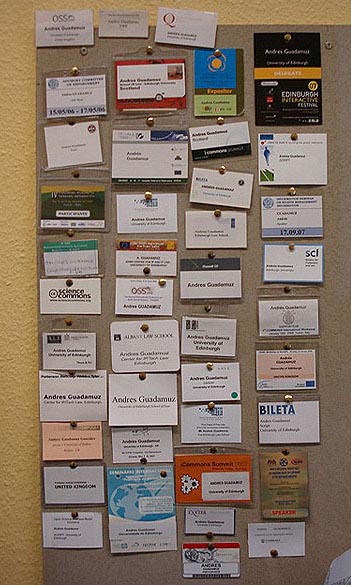EndNote sues open source reference competitor
As many other academics, I have come to rely on reference software to keep my bibliographic resources organised. For some time I have been using Endnote because it came installed with University computers, but I have been increasingly frustrated with its lack of interoperability and inflexible interface. EndNote has many things I like, but as my bibliographical files grew, its limitations became more evident. Lately I have been using a combination of CiteULike, EndNote and Book Collector to keep my books organised.
It seems like I am not the only person dissatisfied with EndNote, and the open source alternatives have been multiplying. I have been particularly impressed with newcomer Zotero from the George Mason University. Zotero is a Firefox 3 plugin that allows scholars to manage their references directly from the browser. It is light, interoperable, feature-rich, and extremely flexible. Whichever way you look at it, is much better than Endnote. So, if you are Thomson Reuters (the owners of EndNote), you would assume that you would welcome the competition and would work hard to improve your own product... but why improve when you can sue your competitor out of existence? Thomson Reuters have done just that, and have sued the State of Virginia and George Mason University for breach of licence (complaint here).
What is Zotero's sin? Interoperability! According to the complaint:
"A significant and highly touted feature of the new beta version of Zotero, however, is its ability to convert - in direct violation of the License Agreement - Thomson’s 3,500 plus proprietary .ens style files within the EndNote Software into free, open source, easily distributable Zotero .csl files. [...] On information and belief, GMU reverse engineered and de-compiled EndNote Software and the proprietary .ens style files contained within the EndNote Software in order to determine how to convert the EndNote .ens style files into the open source Zotero .csl style files, in direct and material violation of the License Agreement."How dare they? They have made it easy for Endnote users to migrate to a competitor! Quick, let's sue the hell out of them!
What are the legal merits of the suit? The licence agreement does indeed have the following restriction:
"2. RESTRICTIONS. End User may not modify, translate, decompile, reverse engineer, retransmit in any form or by any means (electronic, mechanical, photocopied, recorded or otherwise), resell or redistribute the Product, or any portion thereof, without the prior written consent of ResearchSoft. Except as expressly set forth in this Agreement, End User may not make any use of the Product."Notice that the complaint therefore is for breach of contract and NOT for copyright infringement. I think that the reason is clear, decompilation for interoperability purposes is increasingly an accepted user right (see for example, article 6 of the Computer Software Directive). The question therefore at the heart of the case will be as follows: does the strict wording in EndNote's licence which prohibits the decompilation and reverse engineering of EndNote trump the fair use defence of decompilation for interoperability purposes? It is likely that the case will rest on ProCD v Zeidenberg territory, where the pre-emption of contract law over copyright was discussed at length by Judge Easterbrook. My own guess is that the claim is so tenuous that it will not survive legal scrutiny. As others have pointed out, this is clearly a nuisance lawsuit designed to intimidate a competitor out of the market.
However, researchers disgusted with Thomson's lawsuit should do more. I am uninstalling Endnote from all my computers, and will be converting SCRIPTed's EndNote style to Zotero's interoperable open format as soon as possible. I would encourage other academic EndNote users to make their displeasure felt. Such bullying should not be allowed.

 del.icio.us
del.icio.us










